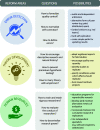Towards open, reliable, and transparent ecology and evolutionary biology
- PMID: 33836762
- PMCID: PMC8034279
- DOI: 10.1186/s12915-021-01006-3
Towards open, reliable, and transparent ecology and evolutionary biology
Abstract
Unreliable research programmes waste funds, time, and even the lives of the organisms we seek to help and understand. Reducing this waste and increasing the value of scientific evidence require changing the actions of both individual researchers and the institutions they depend on for employment and promotion. While ecologists and evolutionary biologists have somewhat improved research transparency over the past decade (e.g. more data sharing), major obstacles remain. In this commentary, we lift our gaze to the horizon to imagine how researchers and institutions can clear the path towards more credible and effective research programmes.
Conflict of interest statement
The authors declare that they have no competing interests.
Figures


References
Publication types
MeSH terms
Grants and funding
LinkOut - more resources
Full Text Sources
Other Literature Sources
Miscellaneous

